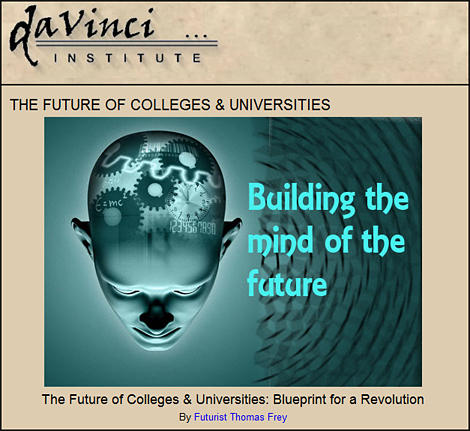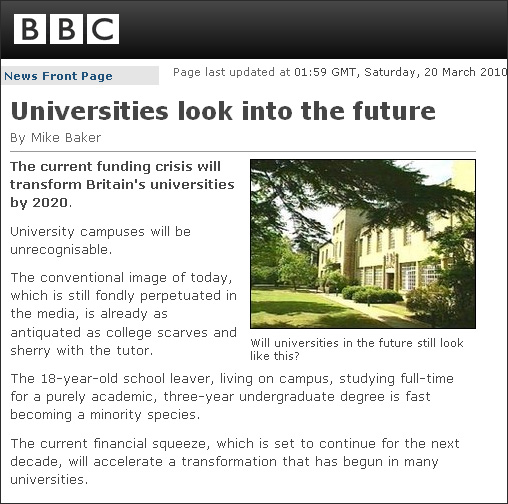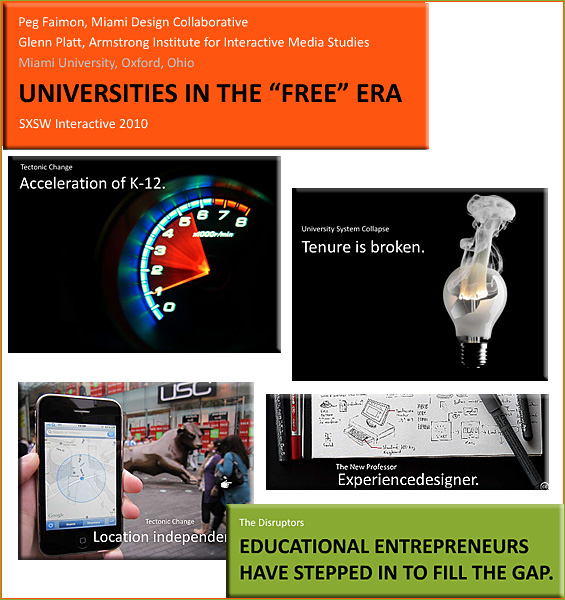From DSC:
The following article got me to thinking of the future again…
Thousands to lose jobs as universities prepare to cope with cuts — from guardian.co.uk (original posting from Stephen Downes)
Post-graduates to replace professors | Staff poised to strike over proposals of cuts
I post this here because I believe that we are at the embryonic stages of some massive changes that will take place within the world of higher education. The timeframe for these changes, as always, is a bit uncertain. However, I would expect to see some of the following changes to occur (or continue to occur) yet this year:
- Cost cutting
- The cutting of programs
- Laying off of staff and faculty
- Not filling open positions
- More outsourcing
- The move towards using more cloud-based-computing models
- The movement of students to lower-cost alternatives
- Greater utilization of informal learning
- The rise of online-exchange oriented offerings (i.e. the matching up of those who teach a subject and those who want to learn that subject)
- The threat to traditional ways of doing things and to traditional organizations — including accreditation agencies — will cause people within those agencies to be open to thinking differently (though this one will take longer to materialize)
- The continued growth of online learning — albeit at a greatly-reduced price
- …and more.
This isn’t just about a recession. The Internet is changing the game on yet another industry — this time, it’s affecting those of us in the world of higher education. When the recession’s over, we won’t be going back to the way higher education was set up previous to the year 2010.
What did those us of in higher education learn from what happened to the music industry? What did we learn from what happened to the video distribution/entertainment business? To the journalism industry? To the brokerage business? To the travel and hospitality industries? To the bookstores of the world?
Along these lines…back at the end of 2008, I posted a vision entitled, The Forthcoming Walmart of Education. So, where are we on that vision? Well…so far we have:
- Straighterline.com
- A significant open courseware movement, including MIT Open Courseware, the Open Courseware Consortium, Connexions, Open Content Alliance, OpenLearn, Intute, Globe, Open Yale Courses, Open Education, The Internet Archive and many others
- University of the People
- YouTube.edu
- iTunes U
- Academic Earth
- and more…
I realize that several of these items were in place before or during 2008…however, at that time, there was no dominant, inexpensive alternative. And there still isn’t one that has jumped into the lead (the University of Phoenix with their 150,000+ students doesn’t qualify, as their pricing is not yet nearly aggressive enough as what I’m predicting will occur).
Though we aren’t there yet, there has been significant change that has already taken place. So…if I were an administrator right now, I’d be asking myself the following key questions:
- Can we reduce tuition and fees by at least 50%? If not, how can some of our offerings be delivered at half the price (or more)?
- How are we going to differentiate ourselves?
- How are we going to deliver value?
- How are we going to keep from becoming a commodity?
- Are we using teams to create and deliver our courses? If not, why not? What’s our plans for staying competitive if we don’t use teams?
Most likely, further massive changes are forthcoming. So fasten your seatbelts and try to stay marketable!











